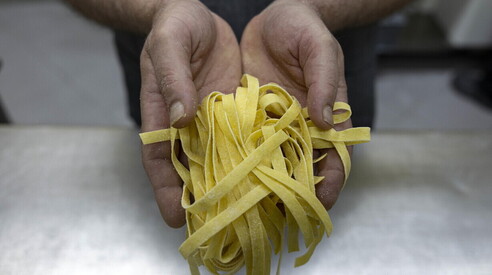The other pasta of the Marche. Massimo Mancini: "Knowledge, then the roads."


Ansa photo
the interview
"We create attractiveness despite everything", says the agricultural entrepreneur, who bets on short supply chains and agricultural identity to give a future to an area outside the main circuits
On the same topic:
"For goodness sake, it would be important to have the roads, the airport, and the stations in order, especially because we want to invest in hospitality, that is, in direct knowledge of our reality. But those of us who work to create value work to attract customers despite any obstacle. Think of unique restaurants like Nico Romito, lost in the Abruzzo Apennines, or certain remote Tuscan wineries: no matter how difficult it is to get there along dirt roads, people will get there anyway." Massimo Mancini , born in 1968, after training as an agronomist, in 2009 started Pasta Mancini, a producer of high-quality naturally dried pasta, based in Monte San Pietrangeli, a charming village in the province of Fermo within the footwear district (for example, Nero Giardini, Pellami Due C, and other subcontractors were born here). Mancini also comes from this background with a typical background: grandfather Mariano was a farmer (a specific production line, ancient grains, is dedicated to him), father Giuseppe worked in the fields and in the leather goods sector for footwear, while Massimo graduated from the University of Bologna with dreams of working at Barilla, only to end up becoming a competitor: "In reality, we are not competitors of the 140 industrialists because our production is just 0.9% of the Italian total, or about 3.7 million tons per year. Ours is just 2.7 thousand tons in 2024, although this year we hope to exceed that, reaching 3 thousand. Likewise, I don't consider those who make fresh or egg pasta as competitors, which is essentially a different profession. What sets us apart from everyone else is that we only work with durum wheat that we grow ourselves, thus having complete control over production and therefore quality, putting our name and surname to it."
Since the beloved old companies from the heroic industrial past have all since been sold to foreigners (Merloni/Indesit, iGuzzini, Poltrona Frau, Benelli, etc.), the Marche regional election campaign would be a good time to address the few recent new ventures. So, Mancini, you're turning the idea that building infrastructure will bring business to the forefront on its head... "Well, I think it's important to create value, in my case for high-quality pasta, whereas in Italy it's still considered just another commodity, despite being the world's leading pasta producer." What should be done then? "Information and knowledge. As an Erasmus student and then during my MBA, I learned from the French how important marketing is. I'm talking about public knowledge, not academic knowledge. Think, for example, of the great work done in recent years on wine in terms of guides, sommelier courses, educational programs, and organized tasting trips. Today, everyone knows what a Montepulciano or a Verdicchio is (Ampelio Bucci died just yesterday), while no one knows what Senatore Cappelli or Gentil Rosso is. Marche is a small region, but third in production (about 13% of the national total) after Sicily and Puglia, thanks in part to figures like the geneticist Nazareno Strampelli. Thanks to him, we have excellent research centers in our region, such as Cermis at the Abbadia di Fiastra and the CGS seed company." And the tariffs? "The results are unclear. Those who produce quality products are less concerned, partly because for now, importers are absorbing the impact, but they are certainly not a positive phenomenon." Finally, who will you vote for in the regional elections? “I honestly don't know yet and I'd like to avoid the subject.”
More on these topics:
ilmanifesto





